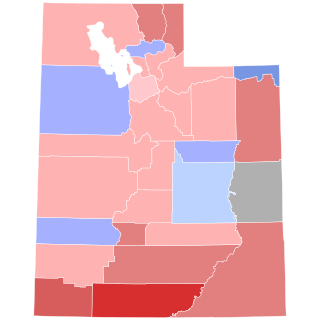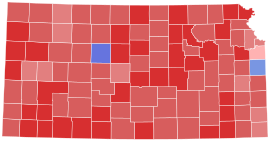
The 2008 congressional elections in Michigan were held on November 4, 2008, to determine who would represent the state of Michigan in the United States House of Representatives. Michigan had fifteen seats in the House, apportioned according to the 2000 United States census. Representatives are elected for two-year terms; those elected will serve in the 111th Congress from January 3, 2009, until January 3, 2011. The election coincided with the 2008 U.S. presidential election.

The 2010 congressional elections in New York were held on November 2, 2010 to determine representation from the state of New York in the United States House of Representatives. New York had 29 seats in the House. Representatives are elected to two-year terms.

The 1974 United States Senate election in Missouri was held on November 5, 1974. Incumbent Democrat Thomas Eagleton defeated Republican nominee Thomas B. Curtis, a former U.S. Representative, with 60.07% of the vote. This was a rematch of the 1968 election, when Eagleton defeated Curtis by a narrow margin.

The 1962 Tennessee gubernatorial election was held on November 6, 1962, to elect the next governor of Tennessee. Incumbent Democratic Governor Buford Ellington was ineligible to run for re-election, as the Constitution of Tennessee prohibited governors from serving consecutive terms at the time. Former Democratic Governor Frank G. Clement defeated Independent nominee William Anderson, and Republican nominee Hubert Patty, with 50.9% of the vote.

The 1958 Kansas gubernatorial election was held on November 4, 1958. Incumbent Democrat George Docking defeated Republican nominee Clyde M. Reed Jr. with 56.46% of the vote.

The 1931 Kentucky gubernatorial election was held on November 3, 1931. Democratic nominee Ruby Laffoon defeated Republican nominee William B. Harrison with 54.28% of the vote.

The 1911 Kentucky gubernatorial election was held on November 7, 1911. Democratic nominee James B. McCreary defeated Republican nominee Edward C. O'Rear with 52.01% of the vote.

The 1942 Kansas gubernatorial election was held on November 3, 1942. Republican nominee Andrew Frank Schoeppel defeated Democratic nominee William H. Burke with 56.68% of the vote.

The 1956 Utah gubernatorial election was held on November 6, 1956. Republican nominee George Dewey Clyde defeated Democratic nominee L.C. "Rennie" Romney with 38.20% of the vote. As of 2024, this is the last time an incumbent Governor of Utah lost re-election.

The 1940 Utah gubernatorial election was held on November 5, 1940. Democratic nominee Herbert B. Maw defeated Republican nominee Don B. Colton with 52.07% of the vote.

The 1946 New Hampshire gubernatorial election was held on November 5, 1946. Incumbent Republican Charles M. Dale defeated Democratic nominee F. Clyde Keefe with 63.14% of the vote.

The 1940 New Hampshire gubernatorial election was held on November 5, 1940. Republican nominee Robert O. Blood defeated Democratic nominee F. Clyde Keefe with 50.74% of the vote.

The 1934 Kansas gubernatorial election was held on November 6, 1934. Incumbent Republican Alf Landon defeated Democratic nominee Omar B. Ketchum with 53.51% of the vote.

The 1928 Tennessee gubernatorial election was held on November 6, 1928. Incumbent Democratic Governor Austin Peay died in office on October 2, 1927. Tennessee’s Democratic Speaker of the Senate, Henry Hollis Horton became governor according to Tennessee’s gubernatorial succession law. In the general election, Henry defeated Republican nominee Raleigh Hopkins with 61.1% of the vote.

The 1922 Kansas gubernatorial election was held on November 7, 1922. Democratic nominee Jonathan M. Davis defeated Republican nominee William Yoast Morgan with 50.87% of the vote.

The 1914 Kansas gubernatorial election was held on November 3, 1914. Republican nominee Arthur Capper defeated Democratic incumbent George H. Hodges with 39.67% of the vote.

The 1904 Kansas gubernatorial election was held on November 8, 1904. Republican nominee Edward W. Hoch defeated Democratic nominee David M. Dale with 57.92% of the vote.

The 1896 North Carolina gubernatorial election was held on November 3, 1896. Republican nominee Daniel Lindsay Russell defeated Democratic nominee Cyrus B. Watson with 46.52% of the vote. This was the only election in North Carolina between 1872 and 1972 in which the Republican nominee won the governor's office, and the only one until 2016 in which no candidate received over 50% of the vote.

The 1920 Indiana gubernatorial election was held on November 2, 1920. Republican nominee Warren T. McCray defeated Democratic nominee Carleton B. McCulloch with 54.63% of the vote.

The 1904 Tennessee gubernatorial election was held on November 8, 1904. Democratic Senator James B. Frazier defeated Republican nominee Jessie M. Littleton with 55.72% of the vote.


















